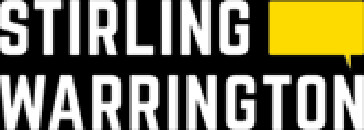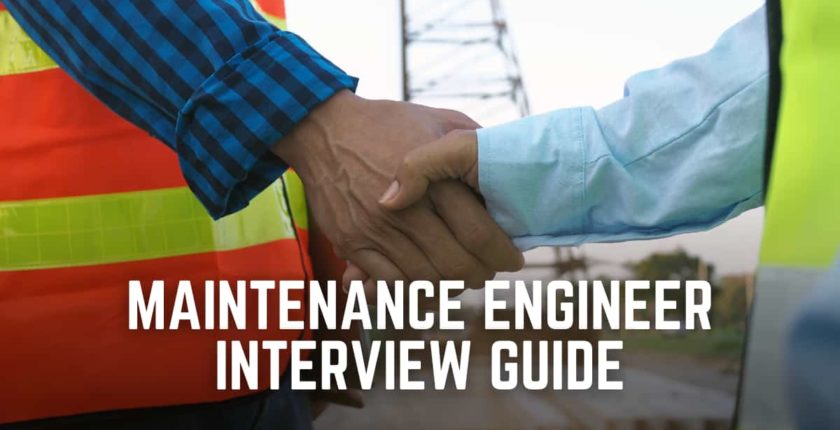Maintenance Engineer Interview Guide
A maintenance engineer interview is critical. It allows the employer to gauge whether you’re suitable for the role. Lets you sell yourself to them as much as possible. And helps you decide if it’s a job you really want. A two-way process.
This article will give you a guide for your maintenance engineer interviews. The guide will take you through the steps you can take to have the best shot at getting the job. I’ll take you through what you can do in all stages of the interview process. What you do before and after your interview can be just as important as when you’re actually in the interview. I’ll be covering:
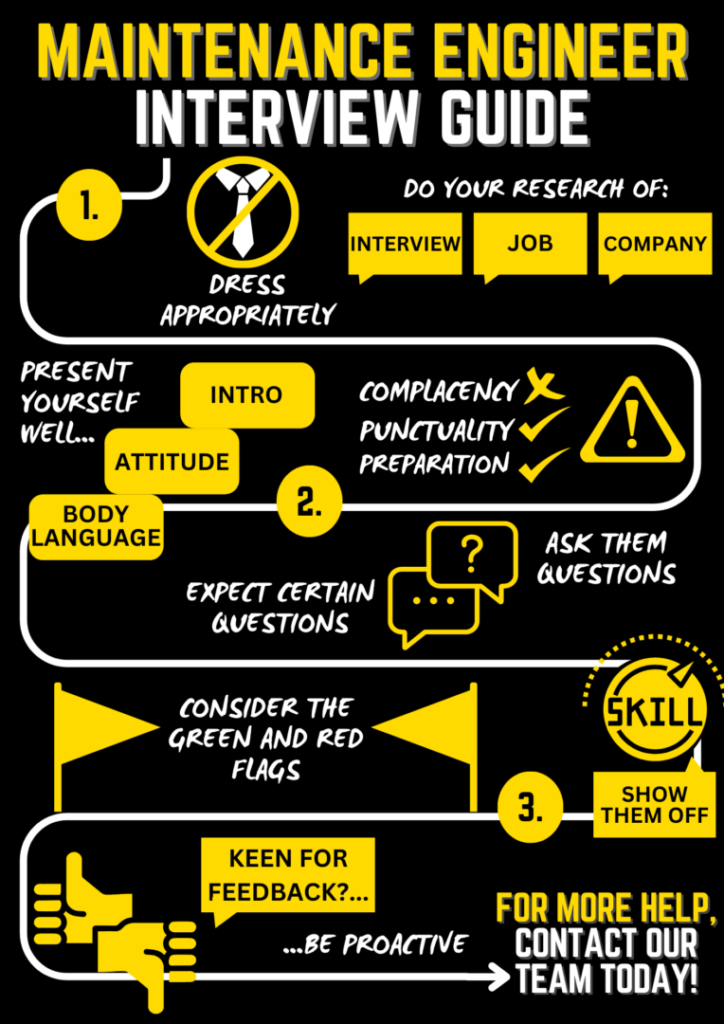
INTERVIEW PREPARATION
Do Your Research
Research is one of the most important parts of your maintenance engineer interview preparation. There are 3 things you need to focus on:
Research the Company
Be aware of the company in all aspects. You need to know:
- What they do
- What products they manufacture
- Their values.
You’ll need to tailor your answers to the specifics of the company to:
- Create a good first impression
- Display enthusiasm
- Avoid being put on the spot
You can never know too much.
Review the Job
It may seem obvious… But you need to understand the job inside and out to prepare appropriately. Key points:
- Is it a multi-skilled position?
- Is it elec/mech bias?
- What machinery do they have on-site?
- What are the necessary qualifications?
- How many years of experience do they ask for?
There’s no such thing as ‘overprepared’.
Understand the Interview
Maintenance engineer interviews vary. There are a few aspects that they may include:
- Technical test
- Site tour
- Conversation with senior team
Steps you can take to prepare for these types:
- Brush Up on Your technical skills
- Bring your PPE
- Draft some responses
Make sure to chase up these details!
Dress Appropriately
How you present yourself in the interview is the first impression your hiring manager gets. So, it’s important to dress professionally for your interviews.
You must consider the position you’re interviewing for. Dressing too casually could give them the idea that you’re not 100% serious about the role. But also, a lot of engineering managers actually don’t like it when a candidate wears a full suit.
Top Tips?
- Wear trousers that you’re comfortable wearing safety boots with – if you’re a promising candidate the hiring manager will give you a site tour
- I’d advise a jumper with a shirt underneath
- Avoid a full suit
Be Aware of Common Interview Mistakes and Challenges
Unfortunately, complacency is a common mistake at the minute. With so many options out there, you may think you have it in the bag before you even interview – avoid this!
Don’t be complacent and then underprepared!
Nerves are a real challenge for many engineers – especially those with good longevity. I’ve had a few engineers in the past 6 months with this challenge. They look brilliant on paper but haven’t interviewed in years. They certainly know how to fix machines, but the nerves overclouded that.
If interviewing doesn’t come naturally to you, preparation is your friend!
Another common mistake is your punctuality. So…
- Know exactly where you’re going days in advance.
- Traffic can be a nuisance so consider it in your journey time.
- Arrive in plenty of time, it shows you’re reliable and manage time well.
- If there are any issues, communicate!
It’s better to be early than late!
And by knowing how to prepare for an interview, you can avoid these common issues and perform better during the interview…
DURING THE INTERVIEW
How to Present Yourself in the Interview
Introducing Yourself
To be fair you just need to come across as keen.
In the current market, engineers know they’re in demand. But it doesn’t allow for overconfidence and arrogance.
The top top candidates will still work for it from the minute they get there to the minute they leave. Even if almost certain they’ll be offered the job.
Attitude
It is key to maintain a positive attitude throughout.
BE
Calm, Collected, Professional, and Polite.
NOT
Cocky, Pessimistic, or Desperate.
Remember to listen! You need to find the right balance between speaking and listening to create the best impression possible.
Body Language
Body language will convey who you are before you even speak. You need to show confidence! Remember to:
- Smile
- Maintain Eye Contact
- Sit Up Straight
- Avoid Fiddling
Make sure to take on these points! The correct body language can help support your answers and sell yourself even more.
Questions to Expect
There are some key topics of interest for hiring managers. So, you can expect certain types of interview questions:
Scenario Based Questions
- How would you approach a breakdown from point A to point B?
- If there was a health and safety incident on site, how would you approach dealing with this?
Questions Regarding Your Qualifications and Skill Set
- What educational qualifications do you have for a maintenance engineer?
- What skills do you have relevant to the position?
- Tell me about a time when you overcame a problem you faced.
- What skills do you have that will help you to stand out as a maintenance engineer?
Questions Asking About Any Specific Experience Within the Industry
- What work experience do you have in maintenance engineering?
- Do you have any specific heavy plant or manufacturing experience?
- Have you worked in a similar environment to the role?
How to Answer Questions
Most engineering managers will know in a few minutes if they have someone in front of them who’s of use going forward. But I do have some tips to boost your interview:
- Use the STAR approach (Situation, Task, Action, Result)
- Be confident in your answer (even if you’re nervous) but not arrogant.
- Take your time
- Have a conversation with them, they’re people too at the end of the day.
- Throw in some questions for yourself.
- Refer to their processes and bits of machinery they have on their site.
- Turn any missing skills into a positive (e.g., you’ve not worked with a particular machine, but you’ve worked with similar and learn quickly)
Generally, engineer to engineer there will be free-flowing conversation. And if there’s a good level of understanding of what’s needed, this should flow quite naturally. Rather than a formal chat, there will be a more informal conversation, and these are generally the most fruitful.
Skills to Show Off
The hiring manager will be looking out for certain skills. Here are some you should show off in your maintenance engineer interview…
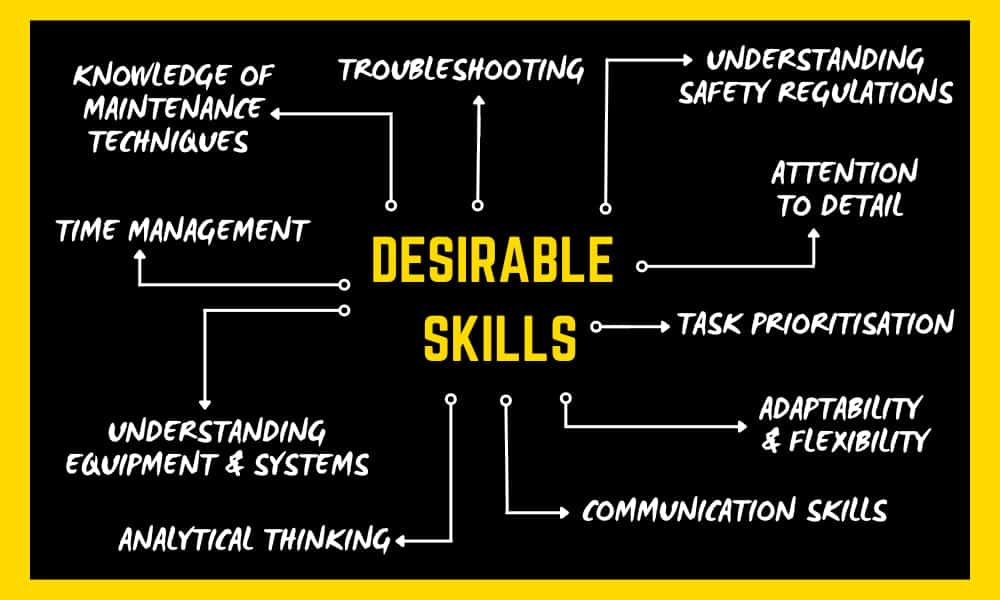
Your understanding of their equipment and systems; Knowledge of different maintenance techniques, software, and tools; Attention to detail; Understanding of, and abidance with, safety regulations; Communication skills; Time management; Task Prioritisation; Analytical thinking; Adaptability and Flexibility; Troubleshooting skills.
Questions You Should Ask
If you have any queries pop up during the interview regarding the role or the company, make sure to ask them. Ask as many as you feel necessary. This shows that you’re keen and inquisitive. But you should also ask questions that show off that you’ve done research about them. Some you could ask are:
- Where do you find major issues on site, and could I remedy that?
- Planned maintenance procedure vs. Reactive?
- Where do you want the business to go?
- What are your future plans for the next 3-5 years?
The latter is a particularly strong one to ask. But why?
- Shows you’re not treating the job as a now, stop-gap sort of role.
- Shows you have a long-term vision and mindset to stay for several years.
- These engineers generally get lots of investment in them.
- You’ll stand out to the hiring manager as they don’t like job hoppiness.
Every element of every job for an engineer is arguably important. But avoid going straight in asking about money. Even if you’re pumping for the high-end of the salary or wanting expensive training courses. Prove your worth first then ask the nitty gritty questions. If you’ve impressed them, they will be more forthcoming with those answers.
Concluding the Maintenance Engineer Interview
When the interview feels like it’s coming to a close. Make sure you’ve got across what you had prepared.
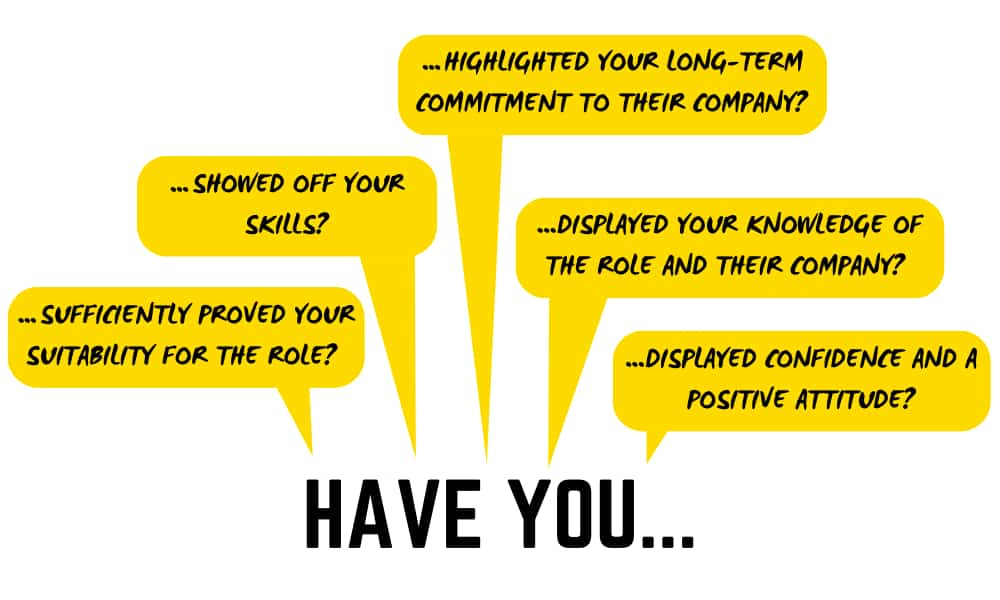
…sufficiently proved your suitability for the role; showed off your skills; highlighted your long-term commitment to their company; displayed your knowledge of the role and their company; displayed confidence and a positive attitude?
You could finish off your interview by asking some closing questions like:
- What else do you want to know from me?
- Is there anything else I can further prove to you to show my suitability for the role?
This will show that inquisitive element which I know engineering managers like.
Wanting to know more details about what to expect in your maintenance engineer interview? Take a look at our other blog. Where we walk you through a mock interview.
Once the interview’s finished you will know in yourself how you think it went. But also if you still want the job. Remember, interviews also allow you to make sure you want to work with them and in that role. But what are the following steps?…
NEXT STEPS
After your maintenance engineer interview, you should reflect on several things. You need to be sure this is the right role for you and know how to follow up and seek feedback
Green and Red Flags to Look Out For…
I advise you to chew on a few aspects of your interview. And you don’t want to just punt for the first one you see as soon as you get offered it. There are several green AND red flags to consider:
GREEN
- An in-depth discussion of what you can offer, but also what you can’t do
- Hiring manager passionate about new people joining and adding to the team
- If the rest of the team has been there for a while
- A prompt but considered response
- When the paperwork comes quickly/alongside the job offer
RED
- A really short interview process.
- If they seem over-keen
- Getting offered the job 30 minutes after leaving – they’re probably desperate
- When the paperwork doesn’t closely follow the offer
- High staff turnover
- Hiring manager not enthused about new starters
Following Up and Asking for Feedback
You should communicate your thoughts and any further questions.
Often the hiring manager is also not only interested in whether they think the engineer is suitable. They want to know what the engineer thinks, especially in a candidate short market.
Be proactive if you’re keen to get their thoughts on either side of the coin. It closes the door for you whether it’s a yes or a no.
Your keenness for feedback, or the way you go about the time after your interview, may help a decision be made.
SUMMARY
The maintenance engineer interview process as a whole is lengthy. But you can be involved every step of the way and immerse yourself as much as possible to have the best shot. Use this guide to get the most out of your interview process. And hopefully, you won’t need to use the guide for a while.
Working with a recruiter will make the whole process run smoothly.
We can help you with your preparation. We’ll know all the details about what the interview entails. So, make sure to pay attention to our advice. We are trying to prepare you and have extra information you can’t find alone. A recruiter’s advice is your biggest asset aside from the skills and experience you hold under your belt.
When it comes to after the interview, you can relay your thoughts and any further questions you have to us. Then we will relay your keenness to the hiring manager.
For example, if an engineer rings me after the interview saying the job’s not for them. I won’t ever try to push anyone into the role. But if you’re keen, I’ll always express that to the hiring manager. That you connected with them, felt you got on well, and know the role is for you.
What Next?
Want to put this new knowledge to good use? Now all you need is an interview. So browse our jobs – good luck!
Fill out the form below to access the Maintenance Engineer Interview Cheat Sheet. Everything you need to know on 1 page.
